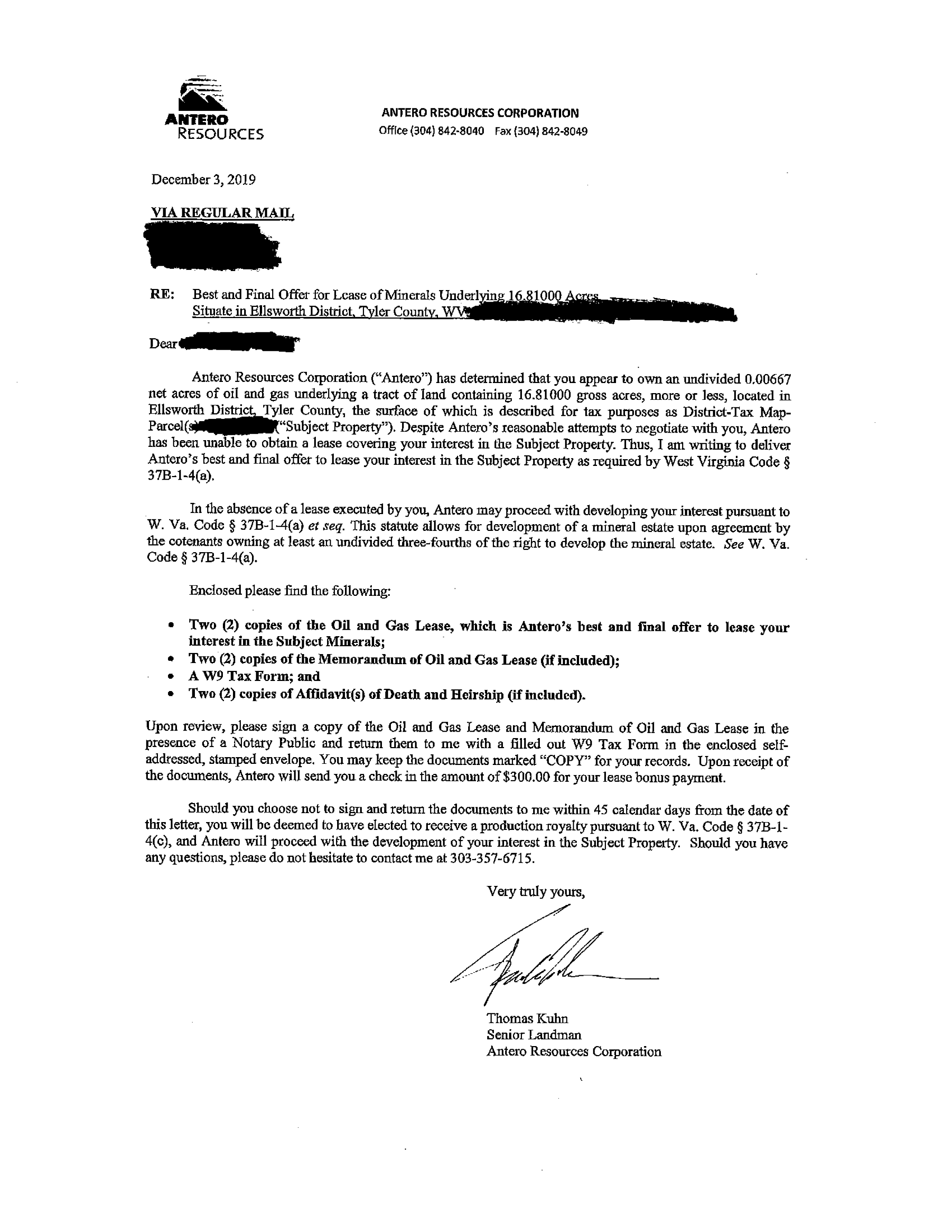
What is Co-tenancy? We understand that contacting an oil and gas law firm can be intimidating. In an effort to alleviate some of the stress and the unknown of contacting our firm, Oil and Gas Coordinator Josh May will discuss some of the types of calls we receive and the approach we take in talking to and representing clients. If you have an oil and gas issue, question, problem, or just want to talk about something that is going on with your property or with the industry, please do not hesitate to contact us at (304) 845-9750 for a free consultation. We are licensed to practice in Ohio, West Virginia, and Pennsylvania. Our practice areas include, Personal Injury, Wrongful Death, Oil & Gas, Medical Malpractice, and Social Security.
Last week we took a look at “net mineral interest” and what you should do in the event you have a fractional mineral interest in a piece of property and you are asked to sign a lease. If you recall, I mentioned near the end of my blog that oil and gas companies have a variety of options and laws to obtain your mineral interests if you do not agree to sign their lease packet. This week we’re going to explore the co-tenancy statute and how the gas company might apply it to your individual case.
The Co-Tenancy Code
In 2018, West Virginia Governor Jim Justice signed into law a bill that was passed by the West Virginia State Legislature more commonly known today as the “Co-Tenancy Modernization and Majority Protection Act” (W.Va. Code 37B-1-4). This law is defined as the lawful use and development by co-tenants; election of interests; reporting and remitting of interests of unknown or unlocatable co-tenants; establishment of terms and provisions for development; and merging of surface oil and gas.
In English, or in more plain terms we can all understand, what this means is that West Virginia passed a law giving gas companies the ability to be awarded a lease for partial mineral interests they had not been able to secure under contract, assuming they meet the other requirements of the bill we’ll touch on in a minute.
The gas companies lobbied in Charleston for years to get a law like this on the books. You see, many landowners refused to sign their proposed leasing terms (and for good reason), or the company could not locate all of the owners who had an interest in the property, therefore, holding up the gas companies’ ability to finish their pooling units. The end result was that some of these properties could not be produced until all of the interest was under lease, which led to significant delays and additional barriers to bringing the unit to production.
How Does it Work?
So how do we get to co-tenancy?
For most of you, it never gets that far. The gas companies are required to make legitimate efforts to try and lease your interest before applying for co-tenancy. Practically speaking, you should be given the opportunity to negotiate your own lease as if you owned 100% of the mineral interest in a subject tract. As we previously discussed, a lot of times some of these interests are so small that it becomes overly burdensome to fight over the interest.
As I talked about last week, there are many times where the gas company will actually pay a premium for this type of interest just to get the leases signed. The values may be much higher than what the current market rates are for leases, it just doesn’t really amount to that much money sometimes when the net interests are tiny. It’s important to note, however, that you are still not obligated to sign a lease. Although the gas company may be willing to pay that premium to have you sign their lease, there still may be additional items to be concerned about, such as net royalty clauses that allow for post-production expenses, surface-related clauses if you do happen to be the surface owner, or countless other terms that may be deal breakers for you.

In the event you cannot agree to terms, or the gas company can’t locate you and they have shown good faith efforts to attempt to do so, then that’s when we get to co-tenancy.
What to Expect with Co-Tenancy?
If the gas companies have made those legitimate efforts to contact you and there is no lease agreement, they may then look to the co-tenancy law to get what they need. We currently represent a couple of clients in Tyler County, West Virginia where this is happening. In this particular case, we’ve been in contact with Antero and have made demands/negotiated terms on behalf of our clients, but we have not been able to reach an agreement.
Here is a copy of a letter that our client received.

Before the gas company moves for a hearing date, you should receive a “best and final” offer letter like the one you see posted here. This acts as a last ditch effort to try and get a lease agreement finalized before co-tenancy. Should you wish to continue to reject their offers, then this may be the last correspondence you receive before receiving notice of your hearing in front of the Oil and Gas Conservation Commission. At this point of the process, if you haven’t already done so, it is advisable to seek legal counsel so that your rights are protected. Should you have any questions relating to co-tenancy, please feel free to contact our office at (304) 845-9750.
What Are My Options?
So where does that leave you if you have an interest that is still unleased and you can’t/won’t agree to terms with the gas company?
The 2018 “co-tenancy statute” states that if the gas company has 75% of the interest already under lease (this is 75% of the total interest in the tract, not 75% of the mineral owners signed up), and there are at least seven or more mineral owners, then the remaining 25% interest qualifies for a hearing with the Oil and Gas Conservation Commission under the statute. At that point, the commission will issue the terms of a lease for that remaining interest. You will receive a bonus payment as if you had negotiated the lease on your own.

One of the highlights of the statute is that you are also guaranteed to walk away with a royalty clause that does not allow the company to take post production costs, which sometimes they won’t offer you during the normal scope of negotiations. You have 45 days to accept the offer, but you do have another option. If after all this, you are still not agreeable to a lease, you have the option under the statute to become a working interest owner in the well(s).
This option may turn out to be more valuable in the long run, but it’s going to take quite a number of years before you start to see any return. It’s important you understand your options. If you are at this stage of the process and you need assistance in determining what to do, please feel free to contact our office at (304) 845-9750 to discuss your situation. We may be able to help.
GKT Oil and Gas Lawyers
As you can probably imagine, there are a lot of issues to understand and a lot of options to consider when faced with signing an Oil and Gas lease, especially as it relates to co-tenancy. Don’t allow the gas company to force you into signing a document without first understanding what rights you have and what options might be available to you. If you have any leasing questions or issues, call our office for a free consultation at (304) 845-9750.


